#essays and analysis
Explore tagged Tumblr posts
Note
i am BEGGING you for those aventurine essays he is legit my fav star rail character
WELCOME TO MY NEW FAVORITE PIT IT'S BEAUTIFUL HERE.
Current essays (full of spoilers) I have already written out:
Why Aventurine is Preservation path and why he doesn't lose (see below)
An analysis of Ratio and Aventurine's interactions on Penacony
An analysis of Aventurine's planning and execution of said plan for 2.1
Why Avigen are Rom-coded and how Aventurine uses his own culture to hurt himself
Aventurine and the Masked Fools
The topic of suicide vs death-seeking vs nihilistic
The Artistry of Manipulation
Essays I have not written but intend to:
The incredible level of self-loathing it takes to call yourself a luck build when you only ever gamble against yourself and the inability to trust that it creates
The difference between stage magic and flourishwork and an analysis of the techniques and props he uses, including why he prefers roulette to cards
Presentation!!! The way he dresses and moves and uses his reputation as a weapon
Topaz and Aventurine's friendship and why they would never call each other friends
Literally anything people wanna know about him
That said, let's get started on why, exactly, Aventurine could never be anything but Preservation. SPOILERS!!!!
OKAY so let's discuss
I would like to begin by reminding you that Qlipoth is a Aeon of "patient, sacrificial, and protective actions", and I don't think I need to go into why Aventurine is the first two BUT I'M GONNA.
Patient--yes, duh. The amount of time it takes to set up stuff behind the scenes before you can even announce a performance--we've seen this from him already. He called Topaz directly after we left Belobog for her help specifically, which we can now assume was him asking to borrow her stone. This means that he had his plan already developed months in advance, and this is confirmed by him sighing over how long it took him to book this specific room in the hotel. Aventurine is patient in that most deadly of ways, the focused strategist mixed with the cunning tactician. He gets impatient, we've seen, but in that anticipatory way that comes from the fizzle of excitement in your veins before a performance, the jitters that aren't quite stage fright but aren't quite excitement, when your blood feels carbonated and your stomach flips because you know it's all in place, you know you've got this, but what if, what if-- and even in the face of that, he's patient.
Sacrificial let's take in two ways. Does he sacrifice? Yes, this man refuses to stop, refuses to accept peace, refuses to settle. He's giving up his own happiness because he knows that happiness isn't for the likes of him and he knows this so deeply he's never even bothered to want it. Aventurine isn't happy, he's unsettled in the most literal way, and he's unbothered by it because he isn't chasing a dream. He's not working toward an ambition, he's not after a goal; he's just living because he isn't dead yet, because he refuses to give up and lay down. He is the embodiment of "because I could not stop for Death, he kindly stopped for me," and is, in other words, #relatable to millenials haha.
He's also sacrificial. As a child of ritual, of expectation, and of the embodiment of hope, Kakavasha was born to be the hope of his people and he never got a say in it. He now carries their entire weight and culture on his shoulders because he's the only Avigen on the universal stage, and it hurts more because he barely even had time to truly learn what that culture was before it was taken from him. He probably considers his continued life as penance, as sacrifice, as the payment for his luck which didn't even help anyone he loved anyway.
And then we get to the hard one because people define protective in a very, uh, selfless context mostly? But it's not, or not only that. Aventurine is very protective; he's protective of his past, of his secrets, of his plans, of that which is his. (Sidenote here: money isn't his. Money is a resource, easily gotten, easily spent; gold and jewels and even status are ephemeral. We see this in that fucking bit of dialogue I LOVE ("I can, and it will be flawless" YAS KING IT SURE THE FUCK WILL!!!!), that he doesn't care for the treasure or the mystery, that he's after the role, the action, the thrill of being right, of wagering his life on the bet that he's right and that it's not death that awaits him.
So that's why he's Preservation, is because he could never be anything else. He's not driven, so it can't be Hunt, and he's not careless and instinctive, so no Elation (ask me about his relationship with Masked Fools sometime, I have THOUGHTS). He doesn't seek pain or to sacrifice for others and his wrath is very focused, so no Destruction, and he's not Abundance by any means, and Harmony is out because that's cooperative and unifying and he can't trust. Remeberance is restraint and he doesn't have that, and Nihility is for those who have given up on something, and Aven hasn't, he can't let his past go like Welt has, and all that leaves is Erudition. It suits him but it's offensive, and he isn't, is he, he's so internally focused on playing his little games against himself that he doesn't seek out multiple targets, and also he's not coldly detached; he's powered by self-loathing and that doesn't jive with Erudition, which is reliant on chosen loyalty and seeking.
IMPORTANT DISTINCTION: self-loathing is not self-destructive. Self-esteem and self-worth are not the same thing, and you can hate yourself just fine while still seeing value in what you do. Speaking of which, let's examine that thing he do, which is just straight up setting up giant convoluted plans in order to specifically bet his life on things. HERE'S WHY.
If you bet money and you lose, then you lose, and Aventurine doesn't lose. Aventurine goes for the high stakes, high risk shit because of the risk, because of the stakes. He's chasing death in an abstracted kind of way; he doesn't want to die, but he doesn't value his life and there's not much worth living for anyway. He's also, as previously stated, the only embodiment of his culture, so he can't lose without it reflecting on...everyone, even if they're all dead. The only respectable way he can die as an Avigen is to die in a gamble.
So any gamble with his life on the line is win-win, and god isn't that adrenaline rush of standing on the ledge and jumping good, doesn't that make his pulse pound and his lungs stutter and his fingers shake, in a way that he can feel, physically, that he can know is him, is only him, alive, reliant on his own power, his own fate, his own skill, and on his luck--
Because that's the thing, isn't it, is Aventurine is lucky, but not in the way Kakavasha was. As a kid, he relied on his luck; after it betrayed him (by leaving him the only one left), he doesn't rely on it anymore. He uses it. He puts in time and patience and skill, and he stacks the deck and sets the dice and gambles that he is smart enough to have anticipated it. He's betting that he's prepared enough to weather the uncertainty. Aventurine isn't playing against us, or Ratio, or Penacony; the only one he's ever really betting against is himself.
#aventurine honkai star rail#i will keep talking about this as long as you let me really i will#essays and analysis#honkai star rail#I have SO MANY THOUGHTS ABOUT THIS MAN#let's discuss the inherent trauma of luck builds: why Aventurine isn't one
52 notes
·
View notes
Text
most funniest sudden deviation from a youtuber’s typical video lineup i’ve seen in recent memory

like bro imagine being SO pissed at the direction a show had taken that you have to momentarily quit spongeposting in order to talk about it for two whole hours. king shit
#pinyatalk#yes. ALL her content is spongebob. except for just that ONE video.#even tho i never watched arcane season 2 (i heard some Things about it that made me turn away from it lol) that essay was still utter PEAK#REALLY good political analysis and critique of themes and characters and such. GOD. plz watch itttt#she may be a spongepilled squarepantsmaxxer but she talks about this shit like she’s known it for yearsss#i haven’t watched the spongebob analyses yet tho. though if the arcane video was peak then all her spongebob stuff must be peak as well…#anyways here’s the videooo (https://www.youtube.com/watch?v=qAgP6V--qYM)
31K notes
·
View notes
Text
Look Back VS AI Art
This is a real frame from Look Back (2024).

You might assume this made it into the final movie because of its director Kiyotaka Oshiyama (押山清高) doing HALF the key animation for the film and only fully finishing it A WEEK before it's festival debut.

And well, you might be partially right about that. But more importantly, this is the movie embodying its themes through its unconventional production process and the very lines on the screen!
In an age of digital tools, CGI, AI, and other combinations of letters ending in I, Look Back is an ode to art and the labor that goes into it, no matter how tedious or imperfect.

Every thought, every little decision, every stroke made by a person puts a little piece of that person onto the screen, and the imperfections that come from that process can be beautiful in the sense that they're evidence of the thoughts and process that went into creating an image. So in keeping with the plot of the movie itself, Oshiyama made a point of leaving those remnants - lines that are scratchy, overlapping, or half-erased, and normally would have been cleaned up in 2nd key animation (第二原画).


Ayumu Fujino has a tight grip on how she expresses herself, having this image to uphold as the perfect prodigy girl. She's afraid to let people see too much of her, lest that perfect image be shattered.

But at times the mask does slip, like this moment of sheer panic after she accidentally drops what is really an extremely rude manga strip under her rival's door by accident.


And it's these moments when that rough imperfection shines through the most! So this breakdown of polish in the art functions simultaneously as both a connection to the human labor that went into creating it, AND an impressionistic representation of Fujino's mental state within the world of the movie.

Not only are the edges of her backpack visible through her arm, her face even disappears completely, replaced by just the roughly sketched dividing lines that indicate the position of her eyes. At least personally, I never would have noticed this fully unfinished frame at full speed because the shot is just so well-executed! The framing is dramatic with Fujino surrounded by these mountains of sketchbooks in the foreground, and the motion is so believable, her posture - hunched over to the side to support the weight of the bag while maneuvering around the books, and the way her legs twirl around each other frantically, rotating this way and that.

But more importantly, this is a frame that an AI program would never draw, because it has no REASON to. There's no thought process, no decisions being made about how to express a feeling. Even if you did train an AI specifically to mimic these human imperfections, in Oshiyama's words, "It would just be a design. It would be a fake. The lines have meaning because they were drawn by humans. […] There's value in that." (MANTANWEB)
This is an adapted excerpt from this video! Go watch it or I'll dox you.
youtube
3K notes
·
View notes
Text
The meaning and symbolism for this artwork (by me):

(TW brief discussion of disassociation)


The ants:
* The main inspiration for this artwork was ant spirals, (this is where ants get stuck in a loop following each other until they die).
* I wanted to relate this imagery to my current life and the up and down cycle of my mental health
* The phrase "this time will be different" is something I think to myself whenever there is a change in my life
* In this artwork the wording strongly contradicts the images of a never ending spiral. It's a false mantra- and holds no weight compared to the impending reality.
The raspberries:
* This part is pretty personal, so I won't be going into too much depth, but to summarise: the raspberries symbolise my childhood and things l've lost to the past. My grandparents had raspberry and blackberry bushes in their garden. I remember picking them with my brother and cousins. A lot has changed since then, so it's a time I wish I could go back to.
* I gave it the white border to represent a stamp/ postcard as if it is a location I could travel to.
* The setting of a large field gives the option of going in any direction but the figure cannot move forwards by being trapped in the past


The string:
* "How long is a piece of string?" I decided to add the string to show the uncertainty of how long the spiraling feeling will last. There is no real answer.
The human figure:
* A representation of me. I often have feelings of not being real. Like I forget I'm a real person that people can perceive. This lasts for various lengths of time- sometimes hours, sometimes months. It can be really jarring when you snap back to reality or feel yourself fading away again.
* I chose a male figure (despite me being female) to further emphasise the disconnect I feel with myself in these moments.
* The head of the figure is a different colour to the body to show that it is completely empty. The body is there but the mind is not.
Overall, I wanted this artwork to convey across the feelings of helplessness and disconnect I feel when stuck in a self made cycle. The phrase "this time will be different" is intended by me to be desperate and pessimistic. However, it can definitely be viewed as hopeful and a way to break the downward spiral. It’s up to the viewers interpretation.
#my art#artists on tumblr#art#digital art#artwork#draw#drawing#artist#surrealist art#illustration#art analysis#analysis#symbolism#weird art#art essay#animal art#fantasy art#original art
2K notes
·
View notes
Text

I didn't start shipping Byler because I picked up on a few moments of chemistry and decided they'd make a cute couple -- I started off by absolutely refusing to entertain said moments as reciprocally queer until I ran into the ridiculous homophobia on the ST subreddit and decided to review Mike's character arc out of sheer gay spite.
Let me clarify: Spite isn't what made me change my mind about Mike. Spite just made me read a few Byler analyses and rewatch the show with an open mind because I didn't want to be like those pricks who would insult and censor queer fans for... [checks notes]... thinking something gay might happen in a TV show with gay people in it. I truly wasn't expecting a queer interpretation to fit Mike's arc anywhere near as well as the default interpretation -- but by the time I'd finished my rewatch, I was reeling from how much better it fit.
Cause that's the thing: Mike's queerness is pretty obvious once you look for it. The difficulty is in giving yourself permission to look.

-------------------
A question Bylers are often asked is "why would the show spend four seasons building up Milevn just to tear it down at the last minute for some unrealistic woke ship? Mike literally said he loves El!" And yeah, Mike's grand love confession at the end of S4 certainly seems like a triumphant pay-off to all that build-up... but I have a few questions of my own.
Firstly: why establish in no uncertain terms that feeling loved is the key to unlocking El's fullest potential against Vecna--


--only to undermine the power of Mike's longed-for confession by having it only be good enough to delay Vecna instead of defeat him? Yes, it's the penultimate season -- so why did Milevn's pay-off happen here instead of S5 where it could properly shine?
Secondly: why couldn't Milevn fix their relationship by themselves? Even if you believe that El commissioned the painting (she didn't) and that the feelings Will describes are truly hers (they aren't), it was still Will who had to perform this romantic gesture on her behalf, and it broke his heart to do so. Why hand this important work off to a third party? Why weave queer tragedy into the build-up towards a heterosexual pay-off that's supposed to feel triumphantly romantic?
Speaking of which: why undermine the intimacy of this scene by having Will hover behind Mike's shoulder the whole time? Couldn't they have asked Noah to take a few steps to the left for the sake of a better shot? Couldn't they have waited until after Milevn's big romantic moment to remind us for the millionth fucking time how sad Will is about it?

In my opinion, this scene and its four seasons of build-up make much more sense if you read them as three entwined character arcs about the trials of growing up in a suffocatingly heteronormative era: the gay kid who doesn't think he's entitled to a happy ending; the abused girl who thinks shallow romance with the first boy who's nice to her will make her feel normal; and the confused hero who hasn't figured out the solution yet.

For all the insistence that this show has to stick to "realistic" depictions of 80s queerness... it's hardly a realistic depiction of 80s straightness for Mike to score an awesome magical girlfriend, either. That's just nerdy wish-fulfillment, and common only as a trope in fiction.
So it's not unreasonable to suppose that Mike's true role in the Subverting 80s Tropes Show might be to represent the actually very realistic 80s experience of getting swept up in compulsory heterosexuality.
Think about it: Will's vulnerability to the horrors functions as a metaphor for being visibly gay in a world that despises gay people--

--whereas Mike's girlfriend quite literally has the power to protect him from monsters and homophobic bullies alike.


This doesn't mean Mike is callously using El, though. He learned the hard way in S1 that treating an innocent girl like a means to an end would only end up destroying her, and the guilt and fear of hurting her again has been weighing heavy on him ever since.
Comphet isn't about taking advantage of other people's feelings so you can pretend to be straight -- it's about deluding yourself into believing you're straight because queerness isn't an option you're allowed to consider.
Mike genuinely does love El and he genuinely does want to be an important part of her life -- so surely that means he wants to be her boyfriend, right? Twelve is perhaps a little young to know that yet... but surely there's gotta be something here that sets his feelings apart from how a friend or brother would feel?

Surely the reason he later finds himself struggling to say to her face that he loves her is because he's just an immature loser who needs to try harder to grow up and be the man this girl he adores deserves to have...?

...and certainly not because the guilt and fear of losing her just keeps piling up as the romantic instincts he thinks he's been waiting to grow into turn out to be developing at exactly the pace they're supposed to -- in the wrong direction.

That would be ridiculous. Will's his best friend. Yes, he loves him and can't bear to be without him, but that doesn't mean anything. Why can't a guy display a little unhinged devotion to his special friend without it having to mean something romantic?

Why can't he, indeed.
At his core, Mike is someone who desperately wants to be as special as the straight heroes in the nerdy media he loves. But there isn't anything inherently heroic about being some lame middle-class white nerd who's bad with girls, so he believes that the best he can do is to be a dutiful sidekick who would sacrifice himself in a heartbeat for people he perceives as more special than himself.

For all the "build-up" Mike's romance with El has enjoyed across four seasons, it's done absolutely nothing to help him grow as a character and overcome this self-worth problem.

So is it really any surprise that even after realizing El would be fine and still want to be friends with him if he told her the truth, and even after realizing just how good Will is at understanding his insecurities and reassuring him of his inherent worth--

--Mike would still sacrifice his chance at happiness for the sake of the greater good?
El was literally dying in his arms. How could queer desire possibly be as important as this girl who needed him to be a man and do his damn job so she could do hers?

I'm interpreting Mike as gay here, but I think it's important to note that this principle applies even if he's bi or straight -- Mike can be attracted to girls and still be forcing himself to stay in a relationship with a girl he's not a good romantic match for because that's just what he thinks he's supposed to do.
His sister had a similar problem: Nancy was legitimately attracted to Steve, but her infatuation with him was more about doing what cool teen girls are supposed do than about authentic connection. And because this is a horror story as much a coming-of-age story, Wheeler's conformity had horrendous consequences -- her critical-of-comphet bestie was killed by the horrors.
Which sounds familiar, doesn't it?


(Sure, Max technically didn't die -- but she still died enough for Vecna's plan to come to fruition. Which just brings us back to my first question: why couldn't the Power of Heterosexual Love prevent this? In the same season that said "forced conforming is what's killing the kids", no less?)
Will describes Vecna as an inevitability that won't stop until he's taken everyone -- which in my opinion is the same defeatist attitude demanded by comphet.
It's not that Mr. Refuses-To-Participate-In-Society's-Silly-Play symbolizes comphet itself, per se; rather, he represents the despair of feeling like you can't truly escape it. But either way, this means that the solution to defeating Vecna is the same solution to defeating comphet:
Giving yourself permission to look and see that your true self is far more valuable than whatever you think you're supposed to be.

#apologies for posting such a basic-ass byler proof as late as mid-2025#i wanted a record of my reasons for believing in mike's queerness written in my own words before the final season drops#since i don't write about him often and i feel like my take isn't very well-represented in my essays yet#stranger things#byler#elmike#willelmike#mike wheeler#el hopper#will byers#my analysis
991 notes
·
View notes
Text
It's rare to find media that explores gray relationships: undefined relationships that aren't just some generic flavor of "friends with benefits." People who have seen the best and the worst of each other, the glamorous and the shameful. People who are each other's parent, friend, rival, lover, mentor, and none of the above. People who love so desperately, so fiercely, and have no need to label each other.
And then you have Malevolent, which is fundamentally driven by a relationship that is yes, deeply tender, yes, toxically codependent, yes, violent, yes, gentle, yes, angry and messy, yes, joyful and simple. Two beings who are completely at war with each other's existence, yet fight to the bloody death to stay together. Who breathe in tandem for survival, who root for each other's happiness, who sabotage and manipulate each other and are fragile and vulnerable all at the same time.
What a gem, truly.
#entered the fandom went “hello--ah we're all aro and/or ace spec. Makes sense”#you know the hyperfixation got me when the character essays roll out#malevolent#malevolent analysis#malevolent podcast#arthur lester#john malevolent#arthur malevolent
899 notes
·
View notes
Text
Annabeth and Jason’s backstory’s are 100% mirrors of each other’s and I wish they did more with that.
Like Jason’s backstory is supposed to be a foil of Percy’s (Jason is what would’ve happened to Percy if Sally just dropped him off at camp or if he became a year rounder), but it ends up being incredibly similar to Annabeth’s
Both Jason and Annabeth were neglected by their mortal parent, both were at their respective camps way younger than normal, they both are essentially leaders of their camps, and they even share the same older sister
But where Annabeth wanted nothing more than a call to adventure it was thrust upon Jason, where Annabeth’s fatal flaw is hubris, overconfidence, Jason’s is the tendency to deliberate, under-confidence. There’s just so much you can do with them
#jason grace#annabeth chase#thalia grace#camp half blood#camp jupiter#pjo#hoo#hero’s of olympus#percy jackon and the olympians#meta#analysis#potato rambles#potato writes an essay
1K notes
·
View notes
Text
Why I Love Caitlyn, and Why You Hate Her
⚠️ READER DISCRETION: I am not condoning Caitlyn’s actions and behavior, I am simply exploring the depth of her character and explaining what motivated her pursuit of revenge.

There’s no denying the gravity of Caitlyn’s actions as they are unquestionably wrong. However, her character cannot be reduced to these actions alone. This sudden, devastating behavior of hers is shaped by a thread of complex motivations and circumstances, but many choose not to acknowledge this simply because of her elite background.
Like many others, I initially overlooked the point of the gassing in Zaun, which I think is a crucial thing everyone must first understand before diving into the discourse over Caitlyn's character.
The Grey, often misunderstood as being used indiscriminately, was strategically deployed against the Chem-Barons to limit collateral damage. Caitlyn chose precision over chaos, targeting those directly responsible for Zaun’s turmoil. Furthermore, Caitlyn didn’t kill the Chem-Barons; she captured them, with net-deploying bullets. While her methods are controversial, they reflect a calculated approach; mischaracterizing her raid as a reckless attack ignores these details.
This isn’t to deny or excuse the fact that Caitlyn did, indeed, gas Zaun. Who’s to say that gas didn’t seep into the streets where innocent Zaunites roamed, harming them in the process? It’s entirely possible that innocents were affected and devastated. However, my brief explanation is only added to gain better perspective over the objectives of the gassing itself.
Now moving on, despite her privileged upbringing, Caitlyn shows a genuine effort to understand and connect with Zaunites. She places her trust in Vi, a Zaunite she’s never met before, to guide her in her search for Silco. Her journey through the undercity opens her eyes to the struggles of its people, challenging her perspective.
In S1E4, when investigating the airship attack, she encounters an undercity resident and reassures him, “I can protect you.” Later in the season, when Vi gets stabbed, Caitlyn encounters someone formerly connected to Vi. He’s grown a distaste over himself due to his appearance, and yet Caitlyn embraces him with compassion and tenderness, as a silent sign of gratitude. Then, she surrenders her cherished firearm—her only means of protection—in return for a healing potion to save Vi. In S1E7, Caitlyn’s heartfelt monologue in her conversation with Ekko perfectly captures her hope and determination: “This city needs healing. More than I ever realized. Please, let me help you.”
When Caitlyn and Vi stand in front of the Council, Caitlyn declares: “Councilors, this is Vi. She was born in the undercity. Even though we failed her in countless ways, she risked everything to show me what life is really like down there. People are starving, sick, ravaged by Shimmer. They live in constant fear of the coordinated efforts of violent crime lords.” This monologue alone shows how Caitlyn embodies optimism, believing in the inherent goodness of people, even Zaunites. It also shows that she is very willing to fight for them; she sees helping Zaunites as an act of bringing justice and equality into this world.

Many overlook the depth of Cassandra and Caitlyn’s relationship, reducing it to a simple narrative of a daughter mourning her mother. However, Caitlyn’s mourning is more layered than that. Throughout her life, she has been rebellious, driven by a desire to uncover the reality her mother tried to shield her from. In S1E4, Caitlyn reflects on this by saying, “She’d do anything to keep me from seeing the real world.” Caitlyn’s defiance wasn’t just rebellion for its own sake—it was a stand for her ideals. She sought enlightenment and understanding, even if it meant stepping outside the privileged bubble her mother built for her. By venturing into the undercity and aligning herself with Vi, Caitlyn rejected her mother's own ideals.
Here's another scene in S1E8 that emphasizes this:
Cassandra: You're a Councilor's daughter. Your actions reflect on the entire body. Caitlyn: My actions? You know what else reflects on the Council? Its citizens living on the streets. Being poisoned. Having to chose between a kingpin who wants to exploit them and a government who doesn't give a shit!
In a way, her actions mirror Vi’s: just as Vi betrayed her people by working with the enforcers, Caitlyn betrayed her own mother by involving herself with Zaunites. Remember: The last time we see Caitlyn and Cassandra interact on-screen is during Caitlyn’s plea before the Council. And in that moment, Caitlyn was fighting to protect the very kind that would soon kill her own mother.
You say that Caitlyn’s drastic shift is unjustified, as she’s only experienced a fraction of the suffering Zaunites have been enduring. But that’s precisely the point! Her transformation shows how personal loss can drive the change of one’s entire character; she’s never experienced loss before which is why it feels so heavy for her. And unlike Zaunites, Caitlyn actually has the power to act on her grief. Zaunites have only known misery their whole lives. When their loved one dies, they know there is nothing more they can do but grieve. They don’t have an inch of the privilege and military support Caitlyn has. If you had given them the same resources as Caitlyn, they wouldn’t hesitate to bring ruin to Piltover. Simply put, they don’t fight Piltovans because they don’t want to, but because they can’t.
When Jinx takes her mother away, her compassionate ideals completely shatter. Having always sought justice and understanding for Zaun, Caitlyn feels deeply betrayed, as her faith in the good within every Zaunite is overturned. Her mother’s death becomes a turning point—driving her to abandon her ideals and adopt Piltover’s disdain for the undercity, finally understanding the resentment many Piltovans harbor.

We also tend to forget that, aside from losing her mother, Caitlyn has directly suffered under the hands of Jinx. Caitlyn was held captive by Jinx in Season 1—and God knows what was done to her during that period. In the tea party scene, we see Caitlyn break down in tears, visibly flinching when Jinx moves toward her. It’s clear that Jinx has traumatized Caitlyn not just once, but twice. These experiences deeply shape Caitlyn’s actions moving forward. The pain and fear she’s endured push her to a place where she’s willing to sacrifice almost anything, even if it means putting a child’s life at risk (Isha's) or severing ties with Vi.
While they share their differences, Caitlyn and Jinx are the perfect example of foil characters. Here’s an instance which proves this: Both allow themselves to be influenced by manipulative, powerful figures all while being in a vulnerable state of mind.
Jinx is haunted by guilt; her attempt to save her family only ended up killing them, leaving her with the crushing weight of self-blame. She clings to Silco, not because he was the father she needed, but because he was the father she wanted. Silco indulged her destructive tendencies, keeping her at an all-time high on the edges of chaos. Fragile and broken, Powder crossed paths with Silco at the right moment; he saw the perfect chance to mold her into someone bewildered, unrestrained, and astray.

Caitlyn has her own Silco: Ambessa, the ruthless Noxian leader with a brutal philosophy of war. Ambessa enters Caitlyn’s life at a pivotal moment, stepping in just as Caitlyn is grappling with the devastating loss of her mother. In a spiral of self-identity, Caitlyn struggles with the weight of Piltover’s expectations and her unresolved guilt over her strained relationship with her mother (as explained in previous paragraphs). Just as young Powder mourns her family, Caitlyn blames herself for the death of her mother. Caitlyn got herself involved with the Zaunites even when she was warned not to, and at the expense of her defiance came the death of her mother. Driven by guilt and a thirst for vengeance, Caitlyn steps fully into her role, declaring in S2E1: “I am a decorated officer. Leader of House Kiramman.”
Jinx and Caitlyn share a tragic parallel: they both lose everyone they hold dear. Jinx loses Vi, Vander, Claggor, and Mylo. Caitlyn is left without Cassandra, Vi, Jayce, Mel, and Tobias. Stripped of their support systems, they are left isolated, with no one to confide in or rely on. They become vulnerable, used as pawns in the larger schemes of Silco and Ambessa’s strategic games.

Caitlyn's inner turmoil is exactly why Ambessa’s manipulation is so effective. Caitlyn is compelled to take revenge, but she doesn’t know how to. And without anyone else to guide her, she places her complete trust in Ambessa's expertise. Ambessa doesn’t just give Caitlyn the authority and power to avenge her mother; she teaches her how to use them to their full potential. She toys with Caitlyn's vulnerability, making her adopt the Noxian values of wrath, bloodshed, and ruthlessness.
It’s easy to downplay Caitlyn’s grief since she comes from an elite upbringing. While Cassandra Kiramman is laid to rest in a golden casket with a proper burial, countless innocents in Zaun become victims of merciless violence, being left to die on the streets. After the timeskip however, Caitlyn is shown to recognize the moral cost of her actions. Though the series portrays this realization subtly, it becomes evident that Caitlyn is grappling with the inhumanity and immorality of her pursuit of revenge. In S2E4, this internal conflict comes to light during her conversation with Ambessa. When Ambessa attempts to stoke her fury again, Caitlyn disarms her with a piercing question: “Why is peace always the justification for violence?”
Here's another scene that subtly depicts her realization and remorse:
Caitlyn: You're a monster. Why? Why do all this? Singed: Why does anyone commit acts others deem unspeakable? ... For love.
When Caitlyn steps further and sees Orianna, she realizes that Singed's revenge is a reflection of her own: a person grieving the death of their family member. Here, there's a saddened glint in her eyes. She finally understands now, that love and grief made her do things that once seemed so foreign to her. In this case, going against her own principles just to succeed in her revenge.
Caitlyn is now forever haunted by the outcome of her mistakes, but she knows her past cannot be erased. During her confrontation with Jinx in the prison, she admits, “No amount of good deeds can undo our crimes.” While this statement is directed at Jinx, it feels like Caitlyn also holds this against herself for her own wrongdoings.

Caitlyn’s acts of atonement are done quietly. She’s not good with words; she’s bad at articulating how she feels. Ironically, Vi is much better than Caitlyn when it comes to confronting and vocalizing internal conflict. So instead, Caitlyn’s actions speak for herself. By removing the guards at the prison, she tacitly allows Vi the opportunity to rescue Jinx. She knows Vi will come to save her sister, and yet she lets her. She finally lets go of Jinx and the grudge she held against her, as a silent act of her love for Vi.
And in S2E9, Sevika is shown to be sitting among the Councilors. But thanks to a fan's keen eyes, we find out that she is sat particularly on Cassandra Kiramman's chair (which not many notice). By allowing a Zaunite to occupy her mother's seat, Caitlyn gives them a chance to be rightfully represented, a chance for their voices and suffering to finally be heard. It’s a quiet display of Caitlyn’s evolution and willingness to bridge the divide between Piltover and Zaun.
That said, Arcane’s ending left much to be desired regarding Caitlyn’s arc. The heavy focus on Hextech overshadowed the sociopolitical dynamics of Piltover and Zaun. This is the main reason a lot of hate is thrown toward Caitlyn—there is an act of accountability, but there a lack of consequence. While Caitlyn acknowledges her mistakes, her privileged status keeps her from real repercussions, unlike the tragedy other characters had to face. This is frustrating, even to me, as someone whose favorite character is Caitlyn. Yet, in a way, it realistically portrays the inequalities in our own world—where the elite are often shielded from justice, and repentance is the closest they ever come to redemption.
#arcane#caitlyn kiramman#character analysis#league of legends#caitlyn#essay#in this essay i will#food for thought#i guess we really are a league of legends#caitvi#violyn#arcane vi#season 2 spoilers
1K notes
·
View notes
Text
theyre committed to being Dan and Phil™ ... like this isnt "we as Dan and Phil™ need to create all this stuff on the offchance we don't want to be Dan and Phil™ anymore (but obviously continue to be dan and phil lowercase)" this is "we want to keep being Dan and Phil™ and we want to love being Dan and Phil™ in a way that no longer hurts dan and phil lowercase"
563 notes
·
View notes
Text
one thing that i find interesting is that even though we never get to interact with Marika directly, only knowing her via obscure cutscenes and other characters' dialogue... she actually displays a wide range of emotions as much as any other NPCs.
her statues depict her as having a warm, gentle smile:
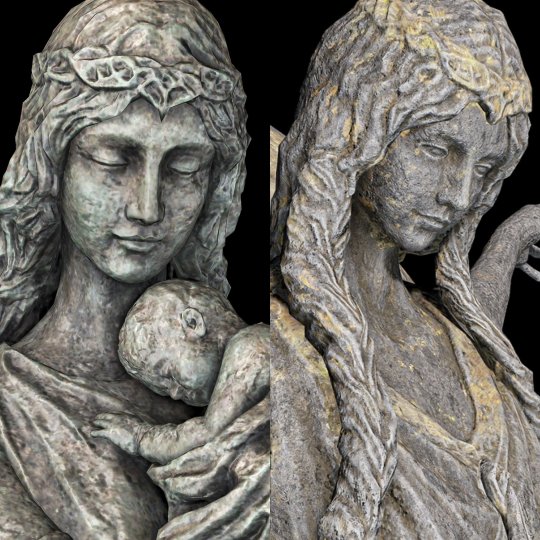
the Mimic veil description points to her playful, mischievous side:
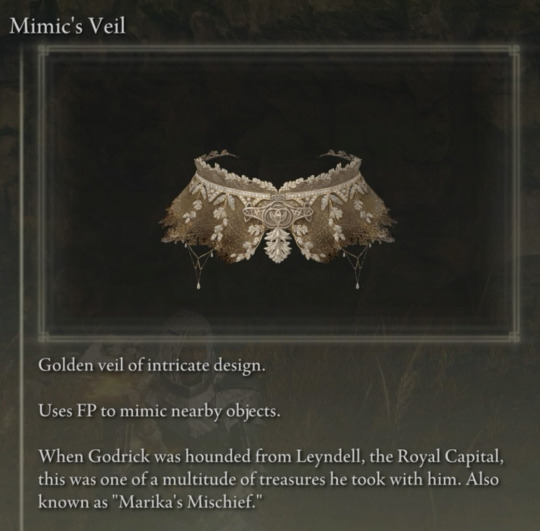
(it's a popular theory in the JP/Asian side of the fandom that it's sth from her childhood - hence the "Marika's Mischief", not "Queen Marika's", and she used it to escape the grisly fate befalling her family.
additionally, its equivalence in Dark Souls is also something described as "the mischief of a young girl who sought relief from the solitude of the woods at dusk", aka Princess Dusk who hails from "Oolacile, land of ancient golden sorceries", but i digress)
her portrait, the story trailer's "Queen Marika was driven to the brink" and Gideon's dialogue after the player defeated Malenia pointed out her sorrow:

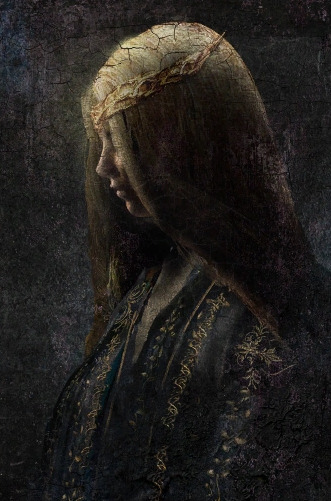
(back when i first played the base game, this is the portrait that drove my eyes most in Roundtable Hold. i kept gazing at her - the Queen with permanently lowered eyes, and thought "there is a girl in there")
The bat lady's song, Messmer's entire Crusade, all those conflicts to establish the Erdtree, shows her anger, and the cruelty she's capable of:

Then there's Shaman's village, the clinic underneath Shadow Keep, the golden braid, the Minor Erdtree, the sealing of Death - that points to grief, trauma, survivor guilt, kindness, and the ruinous drive for revenge that results in the above path down hell:

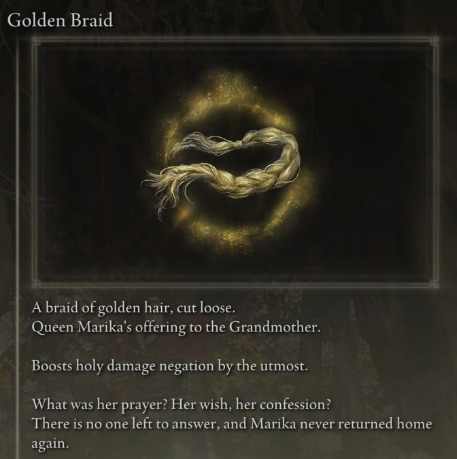
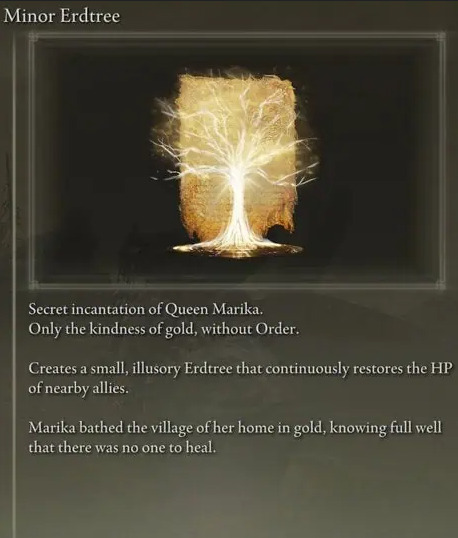
(there's also a theory for the Crusade's headless statue being a reminder for the Hornsent of what they put Marika's mother through, but it's not concrete canon so here is the link if you want to check it out)
The fact that all of Erdtree's incantations are heal and protection spells (with only one exception of Wrath of Gold spell which was found after the Elden Ring was shattered), the Capitol's Perfumers originally being blessed healers, and that all Erdtree blessings come in the shape of tears give the picture of Marika's gentle wish at the beginning: to heal everything and everyone.
(and to me personally, there's a kind of vulnerability and honesty in showing your tears to the world and let it be your power to heal at the same time.)
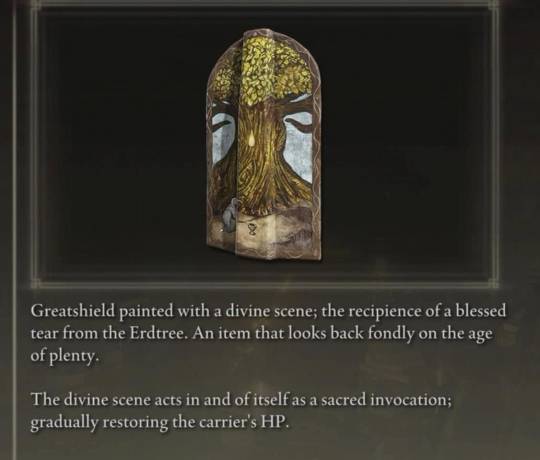

the eye she blessed Messmer with (i do think the Eng translation at some part lost the sentiment of the JP text - that the eye is always referred to as a blessing)
the blessing flask that - unlike its Dark Souls equivalent (which ranges from 6-13 flasks), only have 4 available to us player, heal all ailments and status effect, and specified as sth made for Messmer.
the Marika's soreseal in the Haligtree + the waterfall near Godwyn's final resting place
the Regal Omen Bairn (that was fashioned after the Jizo statue - sth made by grieving parents wishing for protection for their deceased child in the afterlife)
the blessing, gifts, equipment that Messmer and Godwyn's personal knights all get
the fact that Marika's bedchamber and the Impaler's Catacomb (which is the only catacomb in the base game to have the spike trap mechanic used in catacombs in the DLC) remain the proof of Messmer's existence in the base game
how Godwyn's ending is the only ending where the mending rune is placed on the position of Marika's womb (the lower arc or the Elden Ring - also referred to as the basin in which its blessings pool)
that's a whole barrage of motherhood. the love, the fear, the postpartum depression, the guilt and anxiety, (the occasional scheming for revenge with her son). and despite how flawed and tragic that love ends up being for all of them, it is there.
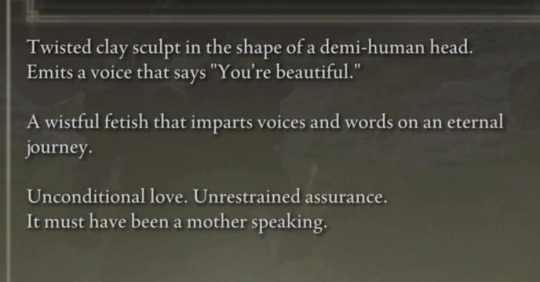
(there's a whole subplot about how Messmer is the only demigod to be called ugly in-game (Hornsent npc dialogue) while Boc's questline is about how his mother being the only one to always assure him he's beautiful, despite everyone else calling him ugly. and how each NPCs questline does reflect a wider theme seen in Marika and her children. but again, i digress)
every time i think of her, Marika is a constantly shifting kaleidoscope, holding everything from within (the beauty and the malign, light and dark, birth and death, she's warm and gentle, she's cruel and unjust, she's strong and kind, she's weak and resentful, she's sweet and she's bitterness made flesh)... and i could only stand there and admire it all.
#elden ring#queen marika the eternal#my uwu baby with a disorder#every time i do the ending the only thing in my head is “to you who bloomed and fell away as a fruitless flower. farewell”#she got me writing essays like the average fandom male character analysis :)#messmer the impaler#er brainrot#golden doomed mother and son#ending this year with another marika rant like god intended
942 notes
·
View notes
Text
The good news about Hbomberguy's plagiarism video for everyone who used to like James Somerton (I recently discovered him and hadn't got to any of the misogynistic shit yet), is that the queer analysis we liked is still out there - just not written by the thieving little shite. Great place to start is the playlist Harry created of plagarised or otherwise hardworking (but underrated) creators:
https://youtube.com/playlist?list=PLRGz5EMig3r2ZDgeGzwUlSz-PzF-L1Xu1&si=KqFfYA1NntIA3JG_
Also, as he's gonna send the profits to the writers James yoinked (without the twist) from, if you wanna help financially, you could always just... Put the video on in the background on repeat...
Tangentially, I met Harry a few years back at WorldCon in Dublin, and thanked him for his videos. He gave me a hug. The guy is just as sweet and lovely, and delightfully wild-eyed*, in real life.
*Seriously, the magnificent bastard has beautiful eyes.
#james somerton#hbomberguy#plagarism#youtube#video essay#queer#queer community#lgbtq+#lgbtqia#gay#film analysis
5K notes
·
View notes
Text
It's interesting how intention and public perception factor in the reception of the axe vs. the berries stunts.
Haymitch did not intend to use the force field as a weapon. He wasn't trying to outsmart anyone, he was just trying to get to the edge in hopes it would give him an advantage.

He didn't even remember the force field until after it aided him. He didn't intend to outsmart the Gamemakers, but Katniss did.

And it's likely why he knew he had to pitch the berries stunt as an emotional lapse in judgement or at least, hoped it would work.

He knew she intended to outsmart the Gamemakers, but he also knows what happens first hand when intention is assumed, and he wasn't going to let Katniss and Peeta's families die.
Even if he didn't intend to outsmart the Gamemakers, even if his goal was just to live, to the capitol, the axe was calculated no matter if it actually was or not.
The difference being Haymitch didn't have propaganda on his side. To the audience, he was a smart rascal who knew how the force field worked, so he must have meant to weaponize it by dragging Silka over to the edge. it doesn't matter what he was thinking at the time, because the footage, the narrative, shows otherwise. he lost the war of public opinion from the second he crafted his image in the interviews.

But Katniss, the giggly, dress-twirling girl, how could she ever intend something like that?
#the hunger games#thg#sunrise on the reaping#haymitch abernathy#sotr#katniss everdeen#sotr spoilers#peeta mellark#thg analysis#thg comparison essays
1K notes
·
View notes
Text
Why Will Byers?
An analysis and theory on why Henry/Vecna targeted Will first in season 1 and his plans for Will in season 5
‼️Contains The First Shadow (TFS) spoilers so please proceed with caution.‼️
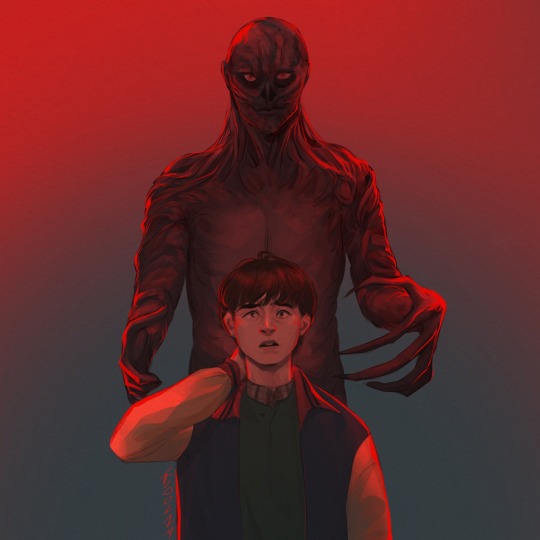
This is going to be a little long but I’ve tried to give as much context as I can without actually being able to show snippets from the stage play. This is my interpretation of everything that went down as a member of the audience and not as someone who has read up any theories about TFS before. To understand why Henry took Will first in 1983, we have to start with -
Henry and Joyce
From all the times I’ve watched TFS, the one thing that has stuck with me is the final conversation Henry has with Joyce. It’s just before his last confrontation with Patty Newby and before he joins Brenner for good. Joyce is the last person (who doesn’t know about Henry’s powers) that he canonically talks to.
Throughout the entire play Joyce, Hopper, and Bob are investigating the animals dying at the hands of Henry and come to the conclusion that Victor Creel has been the one doing the killing. They get so close to solving the case. In her last conversation with Henry, Joyce tries to comfort him by saying that Victor will pay for his crimes - which makes Henry laugh because she’s so close yet so far from the truth. He gets a little frustrated and says something along the lines of “You don’t get it. But someday you will.” (edit 28/9: the exact dialogue is [Henry: you’re too nice. that is how they’ll get you. you have to learn to do anything you can to protect the ones you love] [Joyce: I don’t understand.] [Henry: You will.]) The next time we see Henry make a reappearance in Joyce’s life is during -
The Vanishing of Will Byers
Will is taken into the Upside Down (UD) by Henry. It’s not even a question anymore. All of the context clues from 1x1 lead us to believe that Will’s kidnapping was not by a demogorgon. Will - a 12 year old - miraculously survives a week in the upside down with no food or water. Will is even around the demogorgon a few times in the Upside Down. (Joyce communicating with Will through the lights and then the demogorgon coming after her immediately).
Barb dies the night she is taken but Will stays alive and also somehow manages to talk to Joyce through the wall. Joyce is led exactly to where Will was held at the end of s1 and he makes it out alive. It’s almost as if Henry knew all along that Joyce was the most capable of never giving up on finding her son. Like Henry took Will Byers because he was Joyce’s son. And like he was giving her just enough to know that Will was alive. Even when Joyce and Hopper find him at the end in a state of near death, he’s not injured by a creature. He was being prepared for the next stage of Vecna’s plan -
The Possession of Will Byers
The origins of Henry’s powers happen as such - As a kid, he is transported into the UD (originally coined Dimension X by the government) for a few hours because he touched something he wasn’t meant to touch. During his time in there, he came in contact with the Mind Flayer (MF). According to TFS this is the point in his life when he started getting “corrupted”. Brenner’s dad - who was one of the first people to enter dimension X - had mutated blood after but no powers. Henry was the first person to come in contact with the MF and it’s highly likely he got his powers because of this (This would also track considering how most of the party has been in the UD now but show no signs of having powers). The MF controls Henry for the rest of TFS and Henry grows more power hungry the more he kills.
In S2, Henry presumably sends the MF after Will - who has now had a year to heal from the events of 1983. Will is the only other person in all of ST to have had direct contact with the MF and survived it. Henry didn’t hesitate to kill Billy in S3, but he always gives everyone just enough to keep Will safe. Will himself tells Owens in S2 that the MF wants to kill everyone except him. Will once again survives the entire ordeal and is given a “break” for the next 2 seasons. Except I don’t believe he’s been just given a break. I think Will is -
Henry’s Sleeper Agent.
Ready to awaken in s5. I undoubtedly think that Will is going to have powers. And I don’t think they’re going to be the same as Henry and El. El and the other lab kids get their powers directly from Henry. Will’s powers will be directly from the MF like Henry. I believe this has been Henry’s plan all along and it’s further affirmed by what he tells Will in the recent VR game. That Will will be the key to Henry being able to infiltrate his friends’ minds. Jamie Campbell-Bower also mentioned during the S4 press that to get in character, he set up a display with all of Henry’s victims and targets’ faces on his wall(?), and Will was in the center.
Henry is going to use his connection with Will sneakily and midway through S5 he’s going to awaken Will’s powers (maybe in ep4 - which is said to be titled ‘Sorcerer’ and has young Will in it). Henry is going to try and manipulate his way into making an ally out of Will, and it’s not going to work because -
Will is the Perfect Character Foil.
Will is everything Henry could have been if he had a better support system. He is the perfect character foil. Unlike Henry, Will has a mother who loves him unconditionally and more importantly, believes him. Unlike Henry, the person who Will loves the most (the Patty to Will’s Henry: Mike) is going to love him back and stay by his side all season. No one is going to force them to be apart the way Henry was told to stay away from Patty. Will is not going to be easily swayed even though Henry has spent years crafting him into the perfect soldier. Sure, Henry has seen him heartbroken and sad, but that comes nowhere near to the amount of love and support Will is going to get from his people next season. And they’re going to quite literally defeat Vecna with the power of love and friendship. After that, Will Byers is getting the happy ending that Henry could have gotten.
#stranger things#the first shadow#will byers#henry creel#vecna#vecna/henry/001#hinting at parallels between#hentty#byler#I could write a whole essay about how Mike and Will are set up to mirror Patty and Henry.#but that’s for another time#joyce byers#stranger things meta#stranger things analysis#stranger things theory#my art#the first shadow spoilers
2K notes
·
View notes
Text
Time to talk an unnecessary amount about floors!

Episode 6 of Dungeon Meshi was produced in collaboration with a smaller studio, Enishiya - and it went way harder than I expected, for being made up of two relatively simple and self contained stories focusing on one character each.

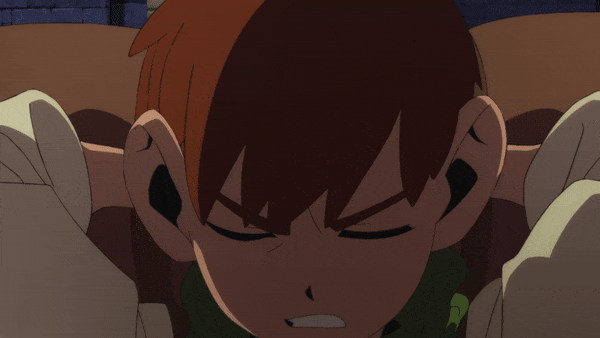
And you can really see how those extra resources meant the animators could give full focus to both halves of the episode. Let's take a look at one piece that stole the show.
The first half was handled primarily by episode director/storyboard artist Keita Nagahara and co-animation director Hirotoshi (or Hiroaki? [1]) Arai. It's actually kinda insane how much of this section can be attributed to these two.
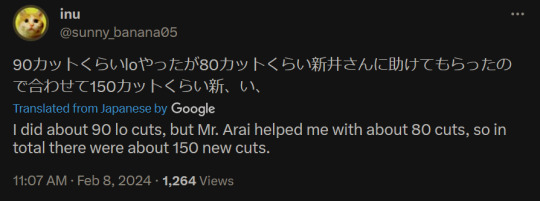
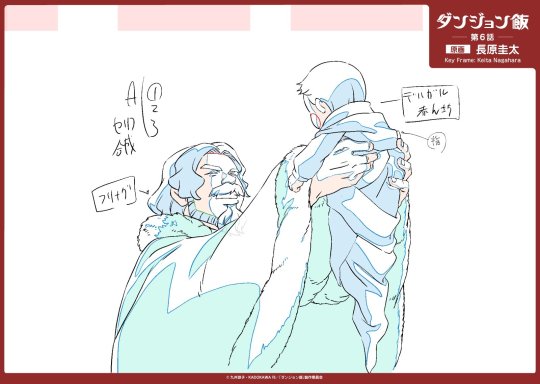
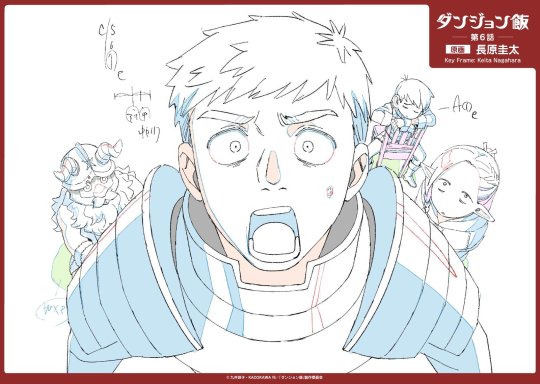
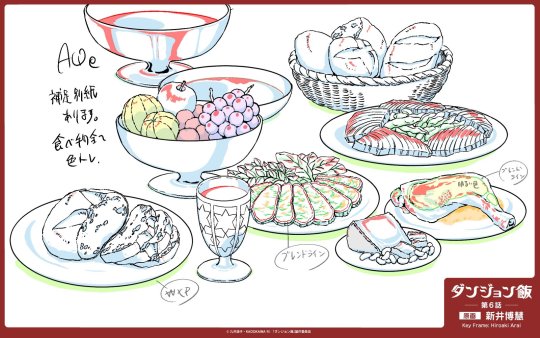
But the real star of the show is the second half, Chilchuck vs the mimic, led by co-animation director Toya Ooshima in his first animation director role for TV anime!
And the biggest aspect that knocked my dang boots off was something that's very consistent with Ooshima's style: background animation!
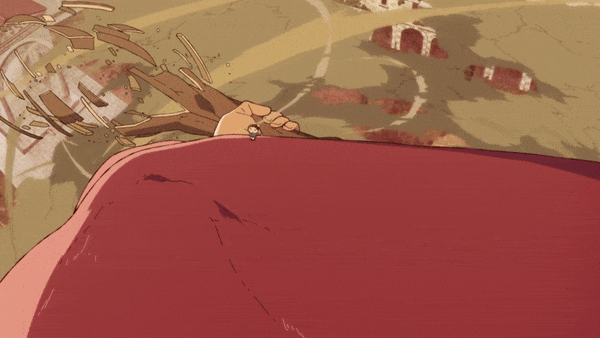
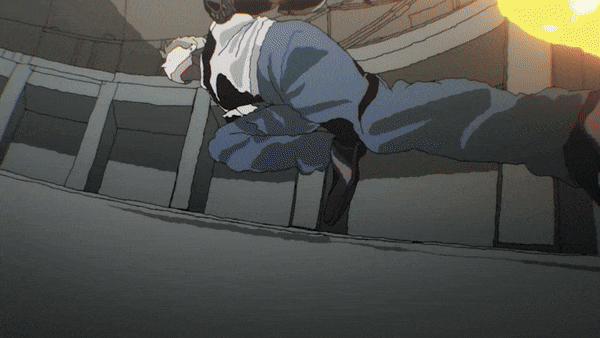
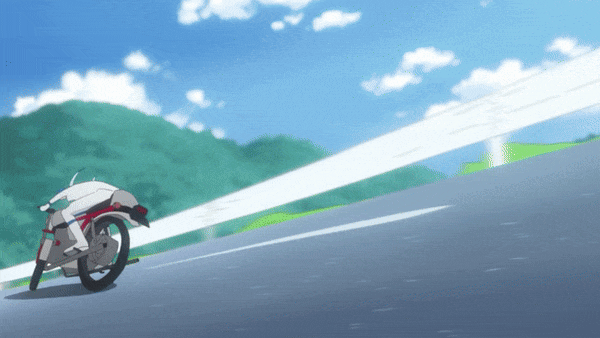
By animating the backgrounds rather than using painted still images, Ooshima and the team of other similarly skilled animators are able to create these beautiful dynamic camera movements that wouldn't be possible otherwise. Like these cuts by Takeshi Maenami where the camera becomes an expressive part of the scene, zipping forward and backward, and tilting to emphasize the speed of this murderous hermit crab. (Maenami's style is also very recognizable here - snappy timing and quick camera movements)


Or this cut by the incredible Kaito Tomioka which cleverly combines a traditional background for the walls with a fully animated floor. The level of detail in these tiles is just completely insane, and used to great effect with this wide, diagonal angle, and the way the camera tentatively drifts forward before reversing direction, and the tiles blur out as it speeds up.

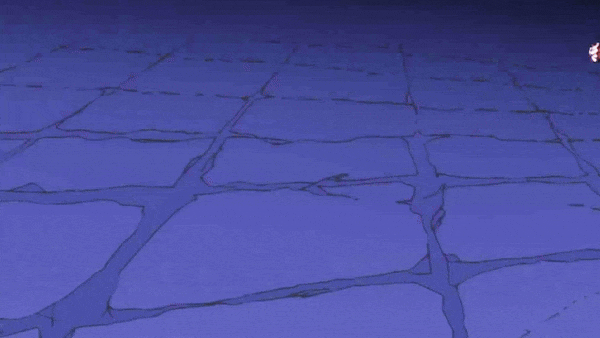
I don't think I'm the only one caught off guard by how much they full-assed this little side story, but it was a pleasant surprise!
I broke down the entire episode in this video here. A lot of research went into this one, and I think it's the best one of these videos I've made so far, so if you're at all interested in more of this type of analysis in video form, I would really appreciate it if you checked it out, or re-blogged this post! Thanks
youtube
[1] It's listed as Hirotoshi on Anime News Network, but Hiroaki on a key frame that Studio Trigger shared on Twitter, so I'm not sure which one is wrong.
#dungeon meshi#animation analysis#studio trigger#laios touden#chilchuck#video#original#mini essay#Youtube
17K notes
·
View notes
Text
SURPRISE !!!!!!!! IT'S AVAILABLE RIGHT NOW!!!!!!!!!!!!!!!!!!!!!!!! ENJOY
youtube
#🐛VIRUS OFFERINGS#MY VIDEOS#KING CANDY#WRECK IT RALPH#ANALYSIS#TURBOTASTIC#turbo wreck it ralph#VIDEO ESSAY#Youtube#Turbo
1K notes
·
View notes
Text
One of the things that's so compelling to me about Eternal Sugar and Hollyberry's storyline, besides the fact that it is wlw, the juxtaposition of happiness and passion is super fascinating. It's easy to compare Eternal Sugar and Hollyberry's dynamic to Shadow Milk and Pure Vanilla because like Shadow Milk, Eternal Sugar is not trying to kill her other half, as she "only wants Hollyberry to be happy." Yet, with Shadow Milk and Pure Vanilla, Shadow Milk wished to corrupt Pure Vanilla in the same way he had been corrupted, and gain someone who fully understood him, as well as to get indirect revenge on Pure Vanilla for being chosen by the Witches instead of him. Shadow Milk did have harmful intentions when he met Pure Vanilla, whereas with Eternal Sugar and Hollyberry, Eternal Sugar has no ill intent.

It could be argued that Eternal Sugar does have ill intent, with her temper and her desire for control, the way she manipulates the people around her so that they remain within her grasp as well as subservient to her, but at the same time, she truly does view her actions as benevolent. She believes that, even if she is hurting people currently, that the ends justify the means, because as long as they stay in her Garden, they can remain happy and healthy forever. If by staying in her Garden, she continues her control over them, well that's just a happy accident!
One of her Arena Loading screen quotes is literally "Your passions will only lead to suffering..." which was such a game changer for me personally, because of the way it frames her motivation. By trapping people in her saccharine web, she is depriving them of their ability to make their own choices and ultimately get hurt, in the name of keeping them safe. Hollyberry's soul jam being passion as a variation on happiness makes a lot of sense, through that lens, because pursuing our passions makes us happy but at the very same time, passion can fizzle out suddenly, or our passions can lead us to ruin. Eternal Sugar tries to subdue the passions of her followers in order to keep them content and complacent, whereas Hollyberry is in direct opposition to that, saying that people should be allowed to go wherever the wind takes them, and her own actions embody that.
Nevertheless, the ways in which both of their soul jams are twisted by their own personal flaws is what makes it so intriguing to me. Hollyberry's "flights of passion" from her kingdom were her responding to her own restlessness, stress, and fear of stagnation, and it led her to abandoning her son and letting him grow up alone. Eternal Sugar, on the other hand, has many cookies that she cares about and yet she condescends to them and exerts control over them against their will in an effort to maintain their happiness. Eternal Sugar is very much an "ends justify the means" sort of person whereas Hollyberry lives in the moment and impulsively flits from place to place in order to keep running from her past. They both have complicated, kind of fucked up relationships with their sons, they both have devotees who follow them while remaining blind to the true flaws of the person they follow, and they both have their vices.

Hollyberry is constantly running and Eternal Sugar never moves. Hollyberry changes easily to fit whichever role is necessary for the situation while Eternal Sugar is unwilling and unable to change. It's almost like unstoppable force meet immovable object, and their polarity is what's so striking to me. Even as Hollyberry runs away from her problems, she does not allow herself to want things or get close to people, for fear of getting hurt. She may be passionate but she has, as Pavlova Cookie says, a cold and empty heart. That's why what Eternal Sugar says to her is groundbreaking because no one has given Hollyberry permission before, but here, she's can take time and it's not about everyone else, it's about her. Yet, the fact that Eternal Sugar is worried about everyone but herself is a great example of the similarities between them, as they both prioritize others above themselves and ignore their own emotions for the sake of other people. They are inherently so different and so similar, literally different shades of the same color, Hollyberry with her warm undertones and Eternal Sugar with her cool ones.
With Dark Cacao and Mystic Flour, they clash because of the fact that they are both unwilling to compromise on their ideals and willing to do whatever it takes to maintain their position. With Shadow Milk and Pure Vanilla, they clash because of Pure Vanilla's unwillingness to entertain Shadow Milk's tricks at a certain point, instead seeing through them and cutting through the bullshit to confront the person behind the mask, something that Shadow Milk is extremely uncomfortable with. Burning Spice and Golden Cheese clash because of Burning Spice's lack of care for his own people and Golden Cheese's possessiveness over her hoard, her kingdom, and her unwillingness to sacrifice that. Burning Spice is too free of burdens, to the point that he has no attachments, and Golden Cheese has so many attachments that they both empower her and bog her down.
The diversity through which the juxtaposition between the Beasts and their Heroes is shown truly is impressive because of both the overlap between different duos and the fact that each duo has something unique to just them. Every duo has shared traits between the two members, and every one has similarities between the Beast and the Hero but the ways in which the level of similarity compared to the level of difference changes throughout the depictions is very cool to me because of the way that it shows how people who are similar can clash over the littlest things, and how people who are so different can come together and unite under one banner.
#cookie run kingdom#look i just had. eternal sugar and hollyberry thoughts that i needed to get out. i needed to put them somewhere#especially before the update comes out with holly's ascended form. . . hough shes so pretty she looks so good im so excited#this is probably going to be my only crk analysis but i needed to talk about it. anyways now i go back to my essay :/#crk#crk eternal sugar cookie#crk hollyberry cookie#hollysugar#eternal sugar cookie#hollyberry cookie#hollyberry crk#eternal sugar crk#eternalberry#shadow milk cookie#shadow milk crk#pure vanilla cookie#pure vanilla crk#shadowvanilla#im a shadowvanilla shipper im sorry thats my toxic yaoi your honor. . . its bad and i like it because its bad. its like a car crash <3#anyways um yeah thats pretty much it. i talk about some of the other pairs but they're only mentioned once each so i will not tag them#cr kingdom#rocktalks
308 notes
·
View notes